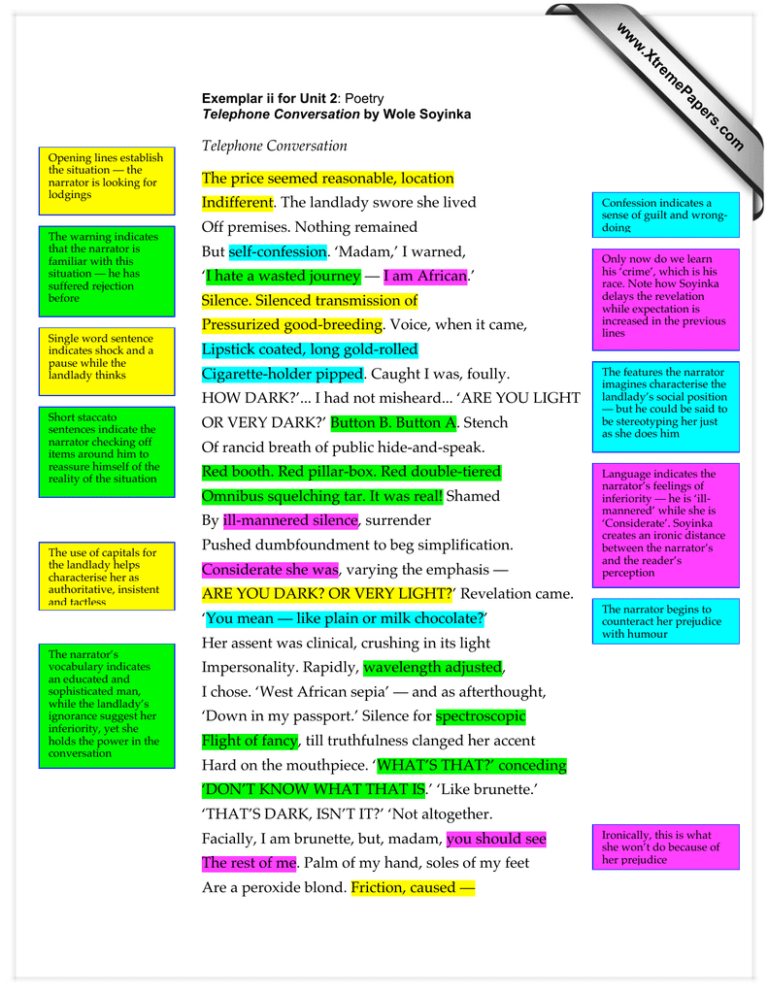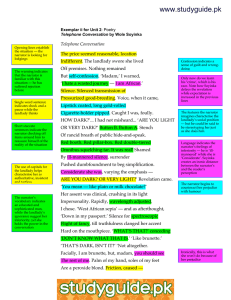Telephone Conversation The price seemed reasonable, location www.XtremePapers.com
advertisement

w w Single word sentence indicates shock and a pause while the landlady thinks The price seemed reasonable, location Indifferent. The landlady swore she lived Off premises. Nothing remained But self-confession. ‘Madam,’ I warned, ‘I hate a wasted journey — I am African.’ Silence. Silenced transmission of Pressurized good-breeding. Voice, when it came, Cigarette-holder pipped. Caught I was, foully. OR VERY DARK?’ Button B. Button A. Stench Of rancid breath of public hide-and-speak. Red booth. Red pillar-box. Red double-tiered Omnibus squelching tar. It was real! Shamed By ill-mannered silence, surrender The use of capitals for the landlady helps characterise her as authoritative, insistent and tactless Pushed dumbfoundment to beg simplification. Considerate she was, varying the emphasis — Only now do we learn his ‘crime’, which is his race. Note how Soyinka delays the revelation while expectation is increased in the previous lines The features the narrator imagines characterise the landlady’s social position — but he could be said to be stereotyping her just as she does him Language indicates the narrator’s feelings of inferiority — he is ‘illmannered’ while she is ‘Considerate’. Soyinka creates an ironic distance between the narrator’s and the reader’s perception ARE YOU DARK? OR VERY LIGHT?’ Revelation came. ‘You mean — like plain or milk chocolate?’ The narrator’s vocabulary indicates an educated and sophisticated man, while the landlady’s ignorance suggest her inferiority, yet she holds the power in the conversation Confession indicates a sense of guilt and wrongdoing Lipstick coated, long gold-rolled HOW DARK?’... I had not misheard... ‘ARE YOU LIGHT Short staccato sentences indicate the narrator checking off items around him to reassure himself of the reality of the situation om .c The warning indicates that the narrator is familiar with this situation — he has suffered rejection before Telephone Conversation s er Opening lines establish the situation — the narrator is looking for lodgings ap eP m e tr .X w Exemplar ii for Unit 2: Poetry Telephone Conversation by Wole Soyinka Her assent was clinical, crushing in its light The narrator begins to counteract her prejudice with humour Impersonality. Rapidly, wavelength adjusted, I chose. ‘West African sepia’ — and as afterthought, ‘Down in my passport.’ Silence for spectroscopic Flight of fancy, till truthfulness clanged her accent Hard on the mouthpiece. ‘WHAT’S THAT?’ conceding ‘DON’T KNOW WHAT THAT IS.’ ‘Like brunette.’ ‘THAT’S DARK, ISN’T IT?’ ‘Not altogether. Facially, I am brunette, but, madam, you should see The rest of me. Palm of my hand, soles of my feet Are a peroxide blond. Friction, caused — Ironically, this is what she won’t do because of her prejudice The narrator again attempts to overcome prejudice with humour, his comic timing emphasised by the hyphens. His reference to taboo body parts is perhaps also a sign of his frustration and predictably brings the conversation to a close Foolishly, madam — by sitting down, has turned My bottom raven black — One moment, madam!’ — sensing Her receiver rearing on the thunderclap About my ears — ‘Madam,’ I pleaded, ‘wouldn’t you rather See for yourself?’ The poem has no formal structure, the telephone conversation itself creating the form. It moves frequently between the spoken conversation and the narrator’s internal thoughts, providing the reader with a constant contrast. The two speaking voices are also distinct, with different vocabularies and Soyinka’s choice of capitals for the landlady. The poem has a comic tone in the final verbal exchanges, but the political point is completely serious. Though the narrator is presented as more intelligent than the landlady, he is in the subservient position throughout, feeling he has to confess his African origins, explain his colour precisely and plead for a chance of a lodging. The characterisation and access to the internal thoughts leads the reader to sympathise with the narrator, creating a mixed response to the poem — an appreciation of the humour combined with shock at the trials the narrator must endure to find a place to live. Again this is what the landlady will not do, and the narrator ends the poem still subservient, having to plead





